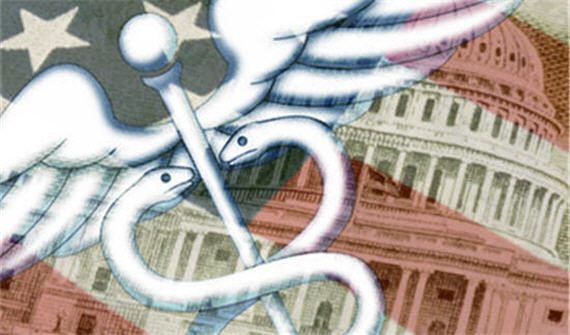Back to Health Care Reform: Government Takeovers and Free Markets
Did we have a free market in health care prior to the passage of PPACA? No.
 I know that every issue in American politics, especially in the Blogosphere, tends to take the tone of “for it” or “against it” and if one is “for it” then “it” is to be imbued with virtue and perfection and if one is against “it” then “it” must be, well, demonic (or, at a minimum, socialists, communistic, and/or fascistic*). As such to defend, or even to speak reasonably about something is to choose a side in the minds of many readers (and writers). I say this because I expect the following to be considered by many in the comment section (and even after this caveat) that I am a whole-hearted supporter of the Patient Protection and Affordable Care Act (PPACA). I must confess to a general ambivalence on the bill** but often find the discussion of it to be problematic at best.
I know that every issue in American politics, especially in the Blogosphere, tends to take the tone of “for it” or “against it” and if one is “for it” then “it” is to be imbued with virtue and perfection and if one is against “it” then “it” must be, well, demonic (or, at a minimum, socialists, communistic, and/or fascistic*). As such to defend, or even to speak reasonably about something is to choose a side in the minds of many readers (and writers). I say this because I expect the following to be considered by many in the comment section (and even after this caveat) that I am a whole-hearted supporter of the Patient Protection and Affordable Care Act (PPACA). I must confess to a general ambivalence on the bill** but often find the discussion of it to be problematic at best.
This is why, for example, I concur with PolitiFact’s crowning, as its lie of the year, the notion that the PPACA is a “government takeover of healthcare,” which I discussed yesterday. To me a “government takeover” would be, at its extreme something like the British system where the government actually does employ the doctors and provide the services. At a less extreme level it would at least require a more thorough removal of the private elements of the system in place, not the least of which being that doctors and insurance companies remain private sectors actors.
In reading the comments to the above linked post and then reading a post by Peter Suderman at Reason’s Hit and Run (Politifact’s Lie of the Year Is An Exaggeration With Elements of Truth)*** I want to address the following:
Meanwhile, our rigorous team of fact-checkers even introduce a misleading statement of their own when they claim that “the law Congress passed…relies largely on the free market.”
The only way this is true is if you utterly fail to distinguish between the concepts of “the free market” and “a highly regulated private sector,” which is a far more accurate description of what the health care law relies on to accomplish its goals.
Emphasis mine. This theme, that we had a free market and then the PPACA came along and wrecked it seemed evident in some of the aforementioned comments and seems to underlie a lot of assumptions about the legislation.
There is one profound problem with that assertion: we didn’t have a free market for health care prior to the passage of the PPACA. We already had “a highly regulated” health care industry. Further, a substantial amount of spending on health care was already in government hands: Medicare, Medicaid, SCHIP, the VA, TRICARE and so forth (as Dave Shuler noted in the comments of my post yesterday). And, of course, things like HMOs were created by Congressional legislation**** as was the current system (dating back decades and decades) of linking health insurance as an employee benefit rather than as part of taxable compensation.***** The notion that we have been playing in a free market prior to the PPACA is problematic to put it mildly.
Indeed, the fundament of our system: one of individually held, privately provided insurance that one uses to go to a privately run doctor’s office remains the mainstay of the system. The PPACA deepens the existing institutional structures, for good or ill. It is hardly radical change.
Beyond any of that, I have reached the conclusion that a free market in health care may be impossible to have, at least in a pure sense, but I will leave that to a separate post.
In conclusion: dislike PPACA all you like. Criticize the whole thing or specifics thereof, but don’t pretend that we had a free market in healthcare prior to its passage: that’s utter nonsense. Does it increase the government’s role in health care? Of course it does, but that remains a far cry from a “takeover.”
*To the political scientists in the audience/those well versed in political philosophy, I am aware that some of the terms in question are incompatible, but apparently most people who use the terms don’t understand that fact.
**Which does not mean, by way, apathy on the subject, but rather, I have multiple responses to the legislation, its goals and its contents.
***Hat tip to OTBer Chris Lawrence’s FB feed.
****In 1973, in fact—which I reckon is before many readers were born.
*****This dates to WWII.





And then there are some of us who think that it has good intentions, and may even be the right thing to do, but at the same time extra-constitutional in it’s implementation, and thus are opposed to it.
I look forward to that post, because I firmly believe that a free market health care system is possible, but it would require that consumers accept a much higher level of risk and to be much more accountable for their own decisions than they are now.
Dr. Taylor, I still believe that the practical application of this legislation, if not its actual intent, is to destroy the remaining remnants of free markets remaining in the system. The incremental approach being used is positively Gramscian.
charles austin, isn’t the new health reform bill substantially the same as the system in the Netherlands and Switzerland? I’ve lived in the Netherlands and visited Switzerland. These are two of the most capitalistic countries I can think of, and yet, somehow, they’ve survived.
Regarding Gramsci, I think your side wins when it comes to controlling public opinion. Virtually all of the gains due to higher productivity in the last thirty years have gone to the affluent, and the government has responded by passing tax cut after tax cut for the most wealthy among us, with no public outcry to speak of. As an example, just recently the Republicans insisted on continuing the Bush tax cuts on capital gains and dividends, with no offsetting cuts in spending, and they then killed a plan providing benefits for the 9/11 emergency responders because it would have added to the deficit. I watch network news, and I haven’t seen much of a response. Believe me, charles, your side has cultural hegemony.
your side has cultural hegemony.
From the beginning of the debate the terms “health care” and “health insurance” have been interchangeable though very different. Since the individual mandate in a clear takeover of health insurance I don’t see a problem with the term being used for health care as well.
We can agree there may never have been a true free market in health care but can we agree this is much less of a free market under Obamacare? Nothing is absolute so playing the word game is just misdirection.
In the public forum some shortcuts must be taken to advance the debate and keep things somewhat simple. As long as the general meanings are not changed or people are misled that’s a reasonable thing to do. Calling this a health care takeover is reasonable.
“Believe me, charles, your side has cultural hegemony.”
Really? But how often are we told that the socialist democrat scumbags, those jealous of the hard-working wealthy, the abortionists, the homosexual deviants, the blacks looking for handouts and affirmative action, the illegal aliens, and just about anyone else who is against mom, apple pie, and the flag are all slowly but surely taking over this once great nation? Who is right…
@Charles,
Your comment, in part, inspired an additional post: click.
> Calling this a health care takeover is reasonable.
Right. And Obama is anti-business by his own admission. Steve says so.
Sorry Plunk, aside from perhaps bithead and zels, no one finds you credible.
anjin, Please point out why my posts aren’t credible. You like to discount them without debating them. That’s where credibility is lacking. Please point out something in my post above that isn’t credible, reasonable, and logical.
Did you ever Google the phrase “Obama is anti business”? There you will find the links you need to support that claim. I won’t do it for you.
> anjin, Please point out why my posts aren’t credible.
You said Obama is anti-business by he own admission. When multiple posters asked you to back up that claim, you could not do it, and took the very weak “I am not doing your research for you” excuse.
Once again, please show where Obama admitted he is “anti-business”. Until you do that, you are a liar, ignorant, or both.
> Did you ever Google the phrase “Obama is anti business
BTW, that is not what you said originally. You said he is “anti-business by his own admission”, which is a very different thing. I am sure there are any number of posts on right wing sites saying he is anti business and probably even lots of op ed on WSJ. That does not support what you said, and it is pretty lame for you to try to edit what you said after the fact.
Your posts aren’t credible. If that bothers you, do the work involved in becoming credible.